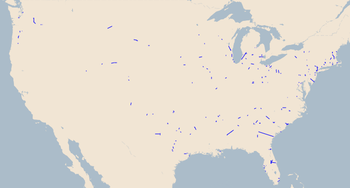Erica and I have been back in Nairobi 50 days. The entire first phase lasted 60 days. Just before holidays, Map Kibera had completed the first public map of one of Africa’s largest slums, around which grew a super excited community in Kibera, Kenya, and globally. And we were exhausted. After a similar length of time, what do we have to show? … eh, not as much! There are plans, plans in motion … but it kinda looks like we’ve been idle. Hardly. The pace is only a little more suited for a 6 month run. The activity has been intense, but more behind the scenes. It wasn’t our strategy to start, but this shape seems to work. A quick, high visibility output demonstrates the full potential, and actually produces something useful. This visibility is the great part of OpenStreetMap’s immediacy, and has brought aTON of interest. Now we’re taking this interest and building something comprehensive.
We haven’t blogged as much, and we’ve resolved to get back on the wagon. Please now allow for a quick bit of narrative gleaned from twitter, gcal, and fading memories.
Lots of talking. First it was great to reconnect with everyone after the break — now they know we meant it when we said we’d come back. The mappers have been meeting once a week, all minuted. The discussion is often on what form the group will take, and what it can possibly do, the vision, and the structure. A couple opportunities immediately came up, including organizing user testing in Kibera for Movirtu, unfortunately not followed by a mapping of phone infrastructure after funding fell through. From Acumen, Suraj arranged trainings for mappers in skills like public speaking and email.
With SODNET, Kipp and Philip, now formally part of the team, we’ve conceived concept, strategized, and budgetted, at the program level, and with the mappers directly. Priceless guidance from them.
We’re very happy to say we’ve started working with UNICEF on phase 2. Josh Goldstein has joined us here in Nairobi, so great. We’ll have more to say on the plan soon.
To take on all the new relationships, we had to have a new entity. We are GroundTruth and Map Kibera is our first project.
We’ve also had great ongoing conversations with Digital Democracy on training techniques, curriculum and overlap in Haiti. Lots of discussion with Ushahidi and KpK on potential expansion of Map Kibera like projects for the long term development of Haiti.
With Melissa Tully and Jamie Lundine from Ushahidi, we are planning trainings within the Kibera media network to manage Voice of Kibera, and we’ve been actively discussing other aspects of Map Kibera and Ushahidi in Kibera and Nairobi. Caleb has started on a redesign of the site, should be sweet.
On the tech side, we’ve been joined by Primoz Kovacic, buccaneering Slovenian mapper. Primoz has been focused on map printing, rationalizing our tagging scheme, and change analysis of satellite imagery. He’s also spent weeks walking steep hills and mapping in Wongonyi (we’ll have more to say there soon too…).
Data is actively being gathered for a map of locations from Togetherness Supreme, the feature film shot in Kibera and produced by our friends Hot Sun.
We’ve launched a WordPress MU install, and set up nearly a dozen sites for community groups in Kibera that lack an easily configured web presence. We’ve had a couple of trainings at our weekly geek meets. KCODA has already switched over their official site, and Kibera Journal has started posting.
KCODA’s premises themselves have undergone transformation, with the preparation and installation of 15 computers from the Zoo Foundation. That will provide a venue for our work. That includes key training in video journalism using Flip cameras.
The project itself has had some video coverage during a great visit by Ory, and later on by Ben from Hivos. Later today we host a visit from the Acumen Fellows.
In the media, we were interview and profiled by Technology for Transparency Network, and mentioned in the landmark OSM profile in the UK Guardian. We’ve gotten mention in talks and discussions all over.
We’ve gone out to spread the word. The mappers took it to 1% Club. I gave a talk for to ICCM, from the outside deck at the iHub launch. Earlier in the month webcast to TacticalTech’s Maps for Making Change event. Philip is right now in Rio at the World Urban Forum, presenting Map Kibera at a forum organized by the Woodrow Wilson Institute. I’m flying to San Francisco in a couple days to present at Where 2.0. And next month, Erica is off to South Africa to present at the World Bank Innovation Fair.
A couple weeks ago we participated in the elections technology week, both with NDI and Hivos. Erica took in the spectacle of the Pan African Media conference.
Finally, and most importantly, Josh gave us the idea to start a happy hour, which we dutifully participate in every couple Thursdays at Smart Village. Get in touch for the details!




